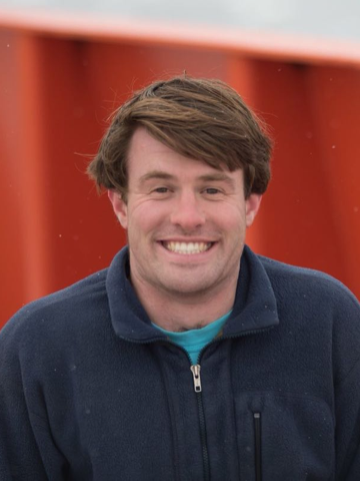Meet Max Rintoul

Tell us a bit about your background: I grew up in Tasmania and developed a strong love of nature while hiking and swimming in the mountains and oceans of southern Australia. Tasmania is a hub for marine science, and I grew up around people who studied environments ranging from the Southern Ocean and Antarctica to coral reefs and the Galapagos. To a kid who loved spending time outdoors, being able to have a job where you had the opportunity to go to these places sounded pretty dreamy.
In 2016, I graduated from the Australian National University with a research-focused undergraduate science degree deceivingly named the Bachelor of Philosophy. I primarily studied chemistry and physics, but my program also allowed me to undertake research projects in fields ranging from the maths of mapping to modeling how hurricanes could prevent algae from overgrowing coral reefs. In Australia, the last year of a science degree is called an Honours year and requires you to design and execute a research project. Going into my Honours year I figured I’d pursue a career in physics; however, I needed to complete one more credit before I could begin. One of the summer courses offered was a two-week field course on One Tree Island in the Great Barrier Reef, and the experience blew my mind. The interdisciplinary nature of reef science, the immediacy of the threats reefs are facing and their sheer beauty had me hooked. I came back to uni and immediately switched my Honours project to coral reef biogeochemistry. It was a tough decision given how much work I’d put into preparing the other project, but I enjoyed my Honours enough to pursue a PhD in the same field, so I’m glad I did it.
What are you studying/researching? I’m continuing to research coral reef biogeochemistry as part of the Scripps Coastal and Open Ocean Biogeochemistry (SCOOBY) Research Group, headed up by Prof. Andreas Andersson at Scripps Institution of Oceanography. Our lab looks at what drives variation in parameters such as pH and oxygen on coral reefs and explores how this variability will influence how coral reefs respond to climate change. In my own work, I look at how water moving around reefs influences their biogeochemistry in a number of different ways. By better understanding the circulation of seawater around reefs I hope to improve our ability to measure reef function, identify reefs that could serve as climate refugia, and understand the drivers of coral bleaching.
Tell us about your professional experience and campus involvement at UC San Diego: While at Scripps I’ve been involved with mentoring several first-year and professional Master's students. When I first arrived in San Diego I benefited greatly from advice from later year students, and I’m glad to have the opportunity to pass on their kindness to newer students. Outside of school, I love to surf and climb and have had the chance to travel around the country with the San Diego Lions Australian Rules Football team.
Why UC San Diego? I primarily chose to come to UCSD and Scripps Institution of Oceanography because I was fascinated by the work being done in the SCOOBY lab and looked forward to being surrounded by marine scientists from so many different disciplines, but the chance to live on the beach in Southern California definitely didn’t hurt! When I first visited Scripps, I caught a cab from the airport around sunset, and after stepping out of the car and seeing the view from the cliffs with the sun dropping into the ocean, I thought the driver had made a mistake. I couldn’t believe this was a school! During my visit, I also met a great group of students and faculty, many of whom I’m still friends with and collaborate with to this day. Overall, the combination of the research, the setting, and the people ended up making my decision for me.
What has been your favorite part about your graduate experience at UC San Diego? Within academia, my favorite part of graduate school has been designing and carrying out a research project in Japan in a field that was pretty new to me at the time. Seeing our plans come to fruition and (mostly) work was highly rewarding, and I’m excited for the follow-up work to come. Outside of school, I’ve particularly enjoyed exploring parts of the western US. Between the southern Sierras, the ocean, and the desert, there’s so much beauty within easy reach of San Diego, and it’s been great to have the chance to explore it.